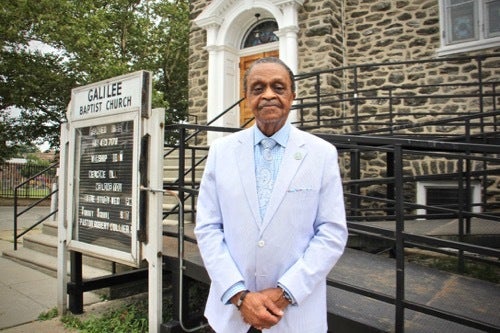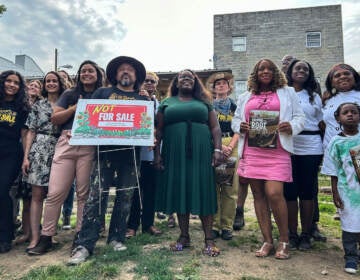Facing eviction? Philly’s Black clergy may be able to help
Philadelphia’s Black clergy are coming out to support tenants as the federal moratorium that had shielded renters from eviction comes to an end.

The Rev. Robert Collier of Galilee Baptist Church helped organize a virtual town hall to educate Philadelphians about eviction diversion programs. (Emma Lee/WHYY)
Philadelphia’s Black clergy are coming out to support tenants as the federal moratorium that had shielded renters from eviction comes to an end.
“We have a responsibility to them holistically, physically, mentally, spiritually, and in any way possible that we can help them to have a better quality of life,” Rev. Robert Collier, president of The Black Clergy of Philadelphia and Vicinity and pastor of Galilee Baptist Church in Roxborough, said at a town hall focused on eviction prevention hosted by his organization and City Councilmember Helen Gym.
Evictions in Philadelphia disproportionately affect people of color and the demographic most at risk tends to be Black women — a phenomenon only exacerbated by the pandemic.
Bishop J. Louis Felton, vice president of Black Clergy of Philadelphia and pastor of Mt. Airy Church of God in Christ, said his faith leads him to believe in housing equality.
“It is of urgent importance that we address housing in as much as the God that we preach, worship, and serve is presented as the householder in Scripture,” Felton said. “We’re here to … open our hearts and engage in honest, open dialogue to seek solutions to make fair and safe housing a reality for all our citizens.”
Other Philadelphia-areas faith leaders that attended included Archbishop Mary Floyd Palmer, Rev. Jerome Fordham, Rev. Sharon McClain, Dr. Rochelle Coles, Rev. Jeanette Davis, Rev. Maxine Collier, Bishop Bill Speakes, Rev. Lugenure Jones, and Rev. Dr. Bernice Baxter.
President Joe Biden asked Congress Thursday to extend the moratorium because of a recent nationwide COVID spike caused by the delta variant, but as of Friday, the moratorium remains set to end Saturday.
Collier offered five tips to congregants and others facing trouble with a landlord.
Don’t wait, reach out as soon as you can
According to Collier, the moment you know you’re without an income is the moment you should be calling your faith leaders.
“The sooner you come to us, the quicker we can resolve it,” Collier said.
He gives this same advice to landlords who are struggling to collect rent from tenants. Before a landlord goes the legal route, he wants them to come to the church so Collier can provide information about city resources like rental assistance, or the eviction diversion program.
Collier said he understands it has been illegal to evict in most cases for nonpayment over the past year but that doesn’t mean people haven’t done it illegally. He wants people to come to the church first before it gets to that point.
“There are ways to amicably resolve it where the landlord is satisfied,” he said. “We don’t want renters being evicted illegally.”
Make a plan
Collier wants tenants and landlords to get a payment plan in writing and to both apply for rental assistance.
The city is pushing for more residents to apply since they’ve only used about 45% of their funding and the deadline for the federal moratorium is approaching.
The latest wave of rental assistance provides both rent and utility assistance.
Contact legal services and pursue mediation
If things cannot be resolved on their own between tenant and landlord, Collier said the next step is to get legal representation. Don’t let shame get in the way, he said.
“Sometimes it’s embarrassing, but it’s more embarrassing to be evicted,” Collier said. “It’s less embarrassing to tell somebody you’re in trouble and you need help and we don’t pass judgment. We help you and you let it go at that.”
If your landlord already began the process to file, they will automatically be enrolled in the city’s eviction diversion program. This requirement is in place until the end of August. At that point, the tenant will automatically get a housing counselor to guide them through the process.
Through diversion, about 84% of landlords and tenants avoid an eviction. People usually leave with a payment plan and rental assistance. But if you need more guidance, the Tenant Union Representative Network holds know-your-rights workshops via Zoom several times a week and the Philly Tenant Rights Hotline can be reached at 267-443-2500. It’s a one-stop number for information and referrals to legal service agencies.
Politicians can help too!
After you’ve tapped legal help and personal connections, Collier advises reaching out to the public officials who represent you.
State Sen. Sharif Street and Congressman Dwight Evans, who participated in the Zoom call, encouraged faith leaders to share their contact information with their respective congregations. But Collier also recommended going to your local city council rep.
“City Council has a responsibility to its constituents, to help the people who need help,” Collier said.
Collier recognized that this option does not lead to immediate relief, but said it would add pressure to make sure elected officials keep housing as a priority. Nearly half of Philadelphians are renters and tenant protection laws directly impact them. Before the pandemic, Philadelphia was evicting about 19,000 people every year.
 WHYY is one of over 20 news organizations producing Broke in Philly, a collaborative reporting project on solutions to poverty and the city’s push towards economic justice. Follow us at @BrokeInPhilly.
WHYY is one of over 20 news organizations producing Broke in Philly, a collaborative reporting project on solutions to poverty and the city’s push towards economic justice. Follow us at @BrokeInPhilly.

Subscribe to PlanPhilly
WHYY is your source for fact-based, in-depth journalism and information. As a nonprofit organization, we rely on financial support from readers like you. Please give today.









